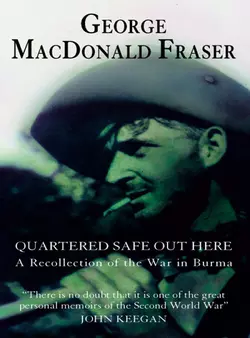Quartered Safe Out Here

George Fraser
Тип: электронная книга
Жанр: Биографии и мемуары
Язык: на английском языке
Стоимость: 463.36 ₽
Статус: В продаже
Издательство: HarperCollins
Дата публикации: 16.04.2024
Отзывы: Пока нет Добавить отзыв
О книге: ‘There is no doubt that [Quartered Safe Out Here] is one of the great personal memoirs of the Second World War’ John KeeganLife and death in Nine Section, a small group of hard-bitten and (to modern eyes) possibly eccentric Cumbrian borderers with whom the author, then nineteen, served in the last great land campaign of World War II, when the 17th Black Cat Division captured a vital strongpoint deep in Japanese territory, held it against counter-attack and spearheaded the final assault in which the Japanese armies were, to quote General Slim, “torn apart”.